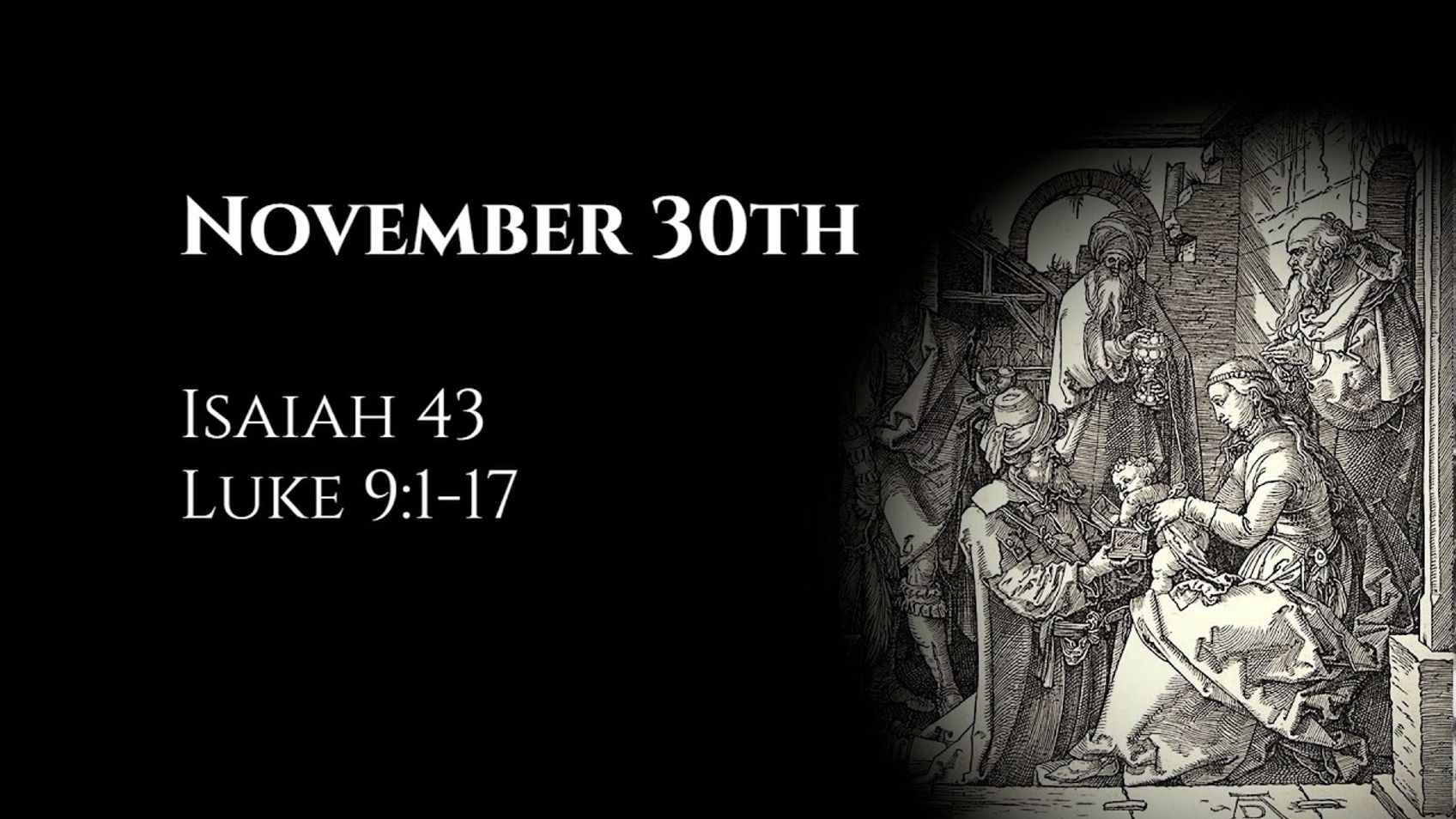November 30th: Isaiah 43 & Luke 9:1-17
November 29, 2021

Alastair Roberts
I have called you by name, you are mine. Sending out the Twelve and feeding the five thousand.
My reflections are searchable by Bible chapter here: https://audio.alastairadversaria.com/explore/.
If you are interested in supporting this project, please consider supporting my work on Patreon (https://www.patreon.com/zugzwanged), using my PayPal account (https://bit.ly/2RLaUcB), or buying books for my research on Amazon (https://www.amazon.co.uk/hz/wishlist/ls/36WVSWCK4X33O?ref_=wl_share).
You can also listen to the audio of these episodes on iTunes: https://itunes.apple.com/gb/podcast/alastairs-adversaria/id1416351035?mt=2.
More From Alastair Roberts
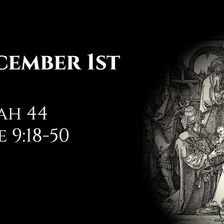
December 1st: Isaiah 44 & Luke 9:18-50
Alastair Roberts
November 30, 2021
Demystifying the idols. The Transfiguration.
My reflections are searchable by Bible chapter here: https://audio.alastairadversaria.com/explore/.
If
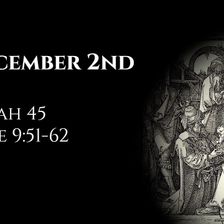
December 2nd: Isaiah 45 & Luke 9:51-62
Alastair Roberts
December 1, 2021
Cyrus, the Lord's anointed. Leave the dead to bury their own dead.
My reflections are searchable by Bible chapter here: https://audio.alastairadversa
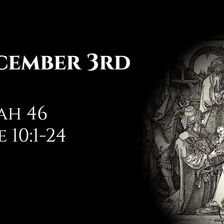
December 3rd: Isaiah 46 & Luke 10:1-24
Alastair Roberts
December 2, 2021
Bel bows down; Nebo stoops. Sending out the seventy-two.
My reflections are searchable by Bible chapter here: https://audio.alastairadversaria.com/ex

The Final Stretch and an Upcoming Course on the Patriarchs!
Alastair Roberts
November 29, 2021
Sign up for Davenant programmes and courses here: https://davenantinstitute.org/davenant-hall (20% off on Cyber Monday!).
If you are interested in su
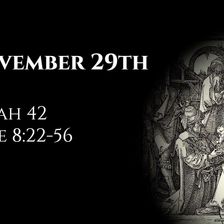
November 29th: Isaiah 42 & Luke 8:22-56
Alastair Roberts
November 28, 2021
Behold, my Servant. Calming the storm, delivering the Gerasene demoniac, and healing the woman with the issue of blood and Jairus' daughter.
My refle
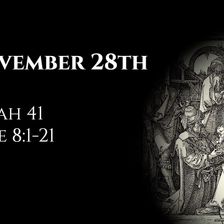
November 28th: Isaiah 41 & Luke 8:1-21
Alastair Roberts
November 27, 2021
Fear not, for I am with you. The Parable of the Sower.
My reflections are searchable by Bible chapter here: https://audio.alastairadversaria.com/expl
More on OpenTheo

Christmas Cranks and Christmas Blessings with Justin Taylor and Collin Hansen
Life and Books and Everything
December 17, 2025
If you are looking for a podcast where three friends talk about whatever they want to talk about and ramble on about sports, books, and grievances, th

Why Should We Pray If God Already Knows What’s Going to Happen?
#STRask
January 29, 2026
Questions about why we should pray if God already knows what’s going to happen, how the effectiveness of prayer is measured, and whether or not things

Protestants and Catholics: What’s the Difference? With Chad Van Dixhoorn, Blair Smith, and Mark McDowell
Life and Books and Everything
November 26, 2025
How should Protestants think about the Catholic Mass? About the Eucharist? About the history and development of the papacy? In this panel discussion,

Is 1 Corinthians 12:3 a Black-and-White Tool for Discernment?
#STRask
October 27, 2025
Questions about whether the claim in 1 Corinthians that “no one can say ‘Jesus is Lord’ except in the Holy Spirit” is a black-and-white tool for disce

Life and Ministry in Charlotte and in the SBC with Clint Pressley
Life and Books and Everything
December 15, 2025
In a rare cultural anomaly that may never be repeated in our lifetimes, the current SBC President and current PCA Moderator live in the same neighborh

Why Would Any Rational Person Have to Use Any Religious Book?
#STRask
December 8, 2025
Questions about why any rational person would have to use any religious book, whether apologetics would be redundant if there were actually a good, un

What Tools of Reasoning Help You Know What’s True, Right, and Good?
#STRask
December 4, 2025
Question about what tools of reasoning help us determine whether something is true or false, right or wrong, good or bad before bringing Scripture int

Conservatism and Religious Freedom with John Wilsey
Life and Books and Everything
October 27, 2025
What is conservatism? And why does it go hand in hand with religious freedom? How should we think about the American experiment of ordered liberty? Ha

How Do I Determine Which Topics at Work Are Worth Commenting On?
#STRask
January 5, 2026
Questions about how to determine which topics at work are worth commenting on, and a good way to respond when you’re in a group Bible study and hear e

The Making of the American Mind with Matthew Spalding
Life and Books and Everything
February 2, 2026
The United States is unique in how much attention it pays to its founding, its founders, and its founding documents. Arguably, the most famous and mos

The Heidelberg Catechism with R. Scott Clark
Life and Books and Everything
November 3, 2025
You may not think you need 1,000 pages on the Heidelberg Catechism, but you do! R. Scott Clark, professor at Westminster Seminary California, has writ

Can You Recommend Good Books with More In-Depth Information and Ideas?
#STRask
January 22, 2026
Questions about good books on Christian apologetics, philosophy, and theology with more in-depth information and ideas, and resources to help an intel

What About Those Who Never Heard the Name of Jesus?
#STRask
December 22, 2025
Questions about what will happen to those who never heard of Jesus or were brought up in a different faith, whether there’s biblical warrant to think

How Can I Explain Modesty to My Daughter?
#STRask
November 27, 2025
Questions about how to explain modesty to a nine-year-old in a way that won’t cause shame about her body, and when and how to tell a child about a pre

Keri Ingraham: School Choice and Education Reform
Knight & Rose Show
January 24, 2026
Wintery Knight and guest host Bonnie welcome Dr. Keri Ingraham to discuss school choice and education reform. They discuss the public school monopoly'
